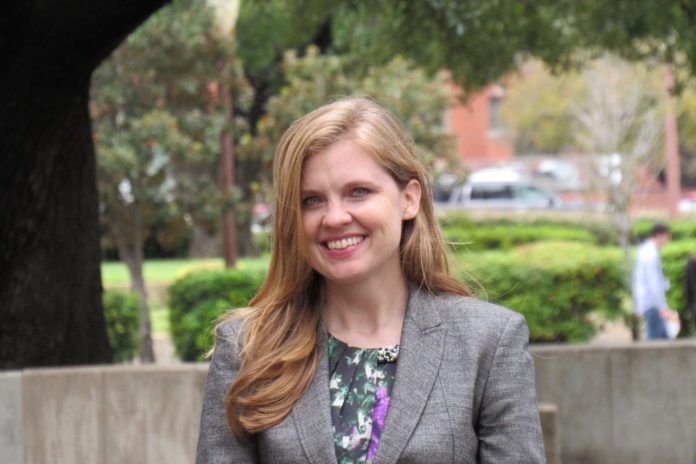
By Tyler Bui | Staff Writer
Dr. Ginger Hanchey, a lecturer in the English department at Baylor, has published her first book of poetry titled “Letters of a Long Name” inspired by her son.
Hanchey specializes in Old English poetry and has been teaching at Baylor for over 10 years. She also earned both her bachelor’s degree and Ph.D. at Baylor.
The book, which contains 23 poems, is inspired by her family’s experience after her second son, Atticus, was born 10 weeks premature with life – threatening complications. She began writing the book around two years after Atticus was born.
“I had never written poetry before, but I felt like suddenly I had something to say and deal with that really mattered to me,” Hanchey said. “I’ve always loved poetry. I have a Ph.D. in Old English poetry, so it’s something that I started thinking I’d like to do [myself]. I started to try and teach myself as much as I could about [poetry] after he was born. I started reading books by famous poets about poetry, and reading more poetry — it became a wonderful hobby and form for healing for me.”
Hanchey said she decided to write the book not only because of her love for poetry, but also to express her family’s experiences and feelings during the first few months of Atticus’ life.
“I felt just an overwhelming urge to talk about what had happened when Atticus was born,” Hanchey said. “Even if it were just talking about it for my own benefit, to try and remember and explore things… and that’s combined with my love for poetry. I think poetry is amazing — I revere poetry. I think that it’s very powerful and can do amazing things, and I wanted a challenge.”
Hanchey said Atticus was born not only prematurely, but also with multiple life-threatening problems.
“[The doctors] didn’t understand how the prematurity was related to these other issues and how those issues were related to each other,” Hanchey said. “It was difficult to treat one issue because the other issue would keep them from using certain medications. Essentially, he was born without the ability to process any food. His stomach was paralyzed, and it wouldn’t process anything. In addition, he had a leak in one of his chest lymph nodes which threatened his lungs and he had to have a chest tube for months.”
After spending almost three months in the hospital, Atticus began showing signs of improvement and eventually he became completely healthy.
“They started resolving on their own, and nobody really understands why they happened and how they fixed themselves; it’s something we’ve never had an answer to,” Hanchey said. “He was in the NICU in Waco for the first month, and he wasn’t making any progress so they transferred him to Cook Children’s Medical Center in Fort Worth and he was there for another two months.”
Hanchey said her book was an opportunity for her to share her and her family’s story, but that it was also a therapeutic experience for her during the writing process.
“The book is a way for me to try and go into what happened, and not just what happened with him, but then afterwards how it affected my other son Oliver and us as a family,” Hanchey said. “It was a really therapeutic thing to do. It works as a timeline, but it does focus on certain specific things—there are moments that I try to describe. But then there are also poems that are looking back and thinking in the big picture about what happened.”
Dr. Dan Hanchey, associate professor of classics at Baylor and Ginger Hanchey’s husband, said his wife’s book helped him revisit the hard times that his family experienced and express feelings that he wasn’t able to express himself.
“She was able to put words to [this experience]—she expressed feelings that I had, but hadn’t been able to articulate, and that was pretty special,” Hanchey said. “It really transports me back to that time period, and it’s really overwhelming to me. For me, that’s helpful because everyone experiences really hard times, and you move on from them. You never forget them— they change who you are. As hard as it was, I don’t want to forget that experience, and I think her book allows me not to forget it.”
Dan Hanchey said he thinks Ginger Hanchey’s book can help others who have experienced similar hardships and represents the healing aspect that art holds.
“I think for people who have gone through hard times, whether it’s a spiritual experience, a family experience or any kind of hardship— she does a good job of being honest and exploring what hardship means and how art can be a means for healing us,” Dan Hanchey said. “It could be a way for them to reexperience and think of their experience in new ways.”
Ginger Hanchey said her favorite aspect of poetry is its ability to transform a reader’s emotions and that she has plans for the future for more poetry work.
“I love that a poem, in such a short amount of space, can make me feel differently by the end of it than when I started reading it,” Hanchey said. “I’ve come to understand that it’s a wonderful way for me to get in touch with what I think about the world.”





